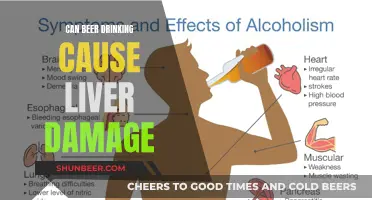
Drinking beer and losing belly fat is not a straightforward equation. While beer does contain calories – about 150 per can – and can contribute to weight gain, it is not the sole cause of a beer belly. In fact, there is no evidence that drinking beer leads specifically to abdominal weight gain. However, alcohol does interfere with fat burning as the liver prioritises burning off alcohol over fat. Additionally, alcohol stimulates your appetite and can lead to unhealthy food choices.
So, can you drink beer and still lose belly fat? The answer is yes, but with some important considerations. Moderation is key, and it is crucial to be mindful of the number of drinks and their calorie content. Alternating alcoholic drinks with water can help reduce overall calorie intake. Choosing healthier drink options and avoiding high-fat meals or snacks while drinking can also aid in achieving weight loss goals.
What You'll Learn

Alcohol calories and weight gain
Alcohol contains almost as many calories as pure fat, with around seven calories per gram. Alcoholic drinks are also often high in sugar, meaning you could be consuming lots of empty calories, which can lead to weight gain. A typical pint of lager contains 180 calories, the equivalent of a slice of pizza. Stouts and ales can be as calorific as a whole bagel (around 250 calories), and a pint of cider can contain as many calories as a sugared doughnut (around 216 calories).
The more alcohol you drink, the higher the chance you will develop a "beer belly". However, this is not necessarily caused by beer alone. Any kind of calories—whether from alcohol, sugary beverages, or oversized portions of food—can increase belly fat. Alcohol also stimulates your appetite and can impair your judgment, leading you to eat more than you might otherwise and make less healthy food choices.
A typical beer has 150 calories, and if you drink several in one sitting, you can end up with a serious calorie overload. Beer also tends to be consumed with high-calorie foods such as pizza, wings, and other fried foods.
Alcohol gets in the way of your body's ability to burn fat. Your liver plays an important role in metabolizing proteins, carbohydrates, and fats, but if given the choice, it will burn off alcohol instead of fat. This means that when you drink alcohol, your liver burns alcohol instead of breaking down fat for energy.
To lose weight, it is important to reduce your overall calorie intake and increase your physical activity. This includes reducing your alcohol consumption and choosing lower-calorie drinks when you do drink. It is also important to avoid eating high-fat or high-calorie foods while drinking alcohol, as this can lead to weight gain.
Tips for reducing alcohol-related weight gain:
- Stick to low-risk drinking guidelines: no more than 14 units a week for men and no more than 12 units a week for women.
- Take more drink-free days throughout the week.
- Swap alcoholic drinks for alcohol-free or low-alcohol options.
- Alternate every alcoholic drink with a glass of water.
- Plan ahead and set a drink limit before going out.
- Choose healthier drink options, such as clear spirits with soda water or a glass of wine instead of cocktails or high-calorie beers.
Drinking and Driving: One Beer, Safe to Drive?
You may want to see also

Alcohol's impact on metabolism
Alcohol has a significant impact on metabolism. When you consume alcohol, your liver prioritises burning it off instead of breaking down proteins, carbohydrates, and fats. This interference with fat-burning can lead to weight gain, especially around the abdomen, resulting in what is commonly known as a "beer belly".
The high-calorie content in alcohol, regardless of the type of drink, contributes to overall weight gain. Alcohol contains almost as many calories as pure fat, with about seven calories per gram. A typical can of beer contain over 150 calories, while a pint of lager has 180 calories, equivalent to a slice of pizza. Stouts and ales can be as calorific as a bagel, with around 250 calories. Additionally, alcoholic drinks are often high in sugar, leading to the consumption of empty calories that can contribute to weight gain and increase health risks.
Alcohol also stimulates your appetite and can impair your judgment, leading to unhealthy food choices. The combination of alcohol and sugary mixers or high-calorie bar food further inhibits weight loss and contributes to weight gain. The metabolic priority that your body places on processing alcohol over carbohydrates and fats creates a metabolic environment that hinders fat burning.
To minimise the impact of alcohol on your metabolism and weight loss goals, moderation is key. It is important to pay attention to serving sizes, choose lower-calorie drink options, and alternate alcoholic drinks with water to stay hydrated. Additionally, maintaining a balanced diet and regular physical activity are crucial for achieving and maintaining a healthy weight.
Bravo Capsule and Beer: A Safe Mix?
You may want to see also

The link between alcohol and appetite
Alcohol and appetite are linked in several ways. Firstly, alcohol stimulates your appetite, which can lead to increased food consumption. This is further exacerbated by the fact that drinking can impair your judgment, leading to less healthy food choices. The food typically consumed with alcohol, such as pizza, nachos, and other high-fat, high-calorie options, can contribute to weight gain.
Secondly, alcohol interferes with your body's ability to burn fat. Normally, your body burns fat reserves for energy. However, when alcohol is present, your liver prioritizes burning off alcohol instead of fat. This metabolic shift creates an environment that inhibits fat burning and promotes weight gain.
Additionally, alcohol provides a significant number of empty calories. A typical beer contains around 150 calories, and when consumed in excess, can lead to a calorie overload. These extra calories, if not burned off, are stored as fat. The location of fat storage is influenced by age, sex, and hormones. Men tend to store more fat in their bellies, while women tend to store fat in their arms, thighs, and buttocks, in addition to their bellies.
Finally, alcohol can affect your hormones. In men, excessive alcohol consumption is associated with reduced testosterone levels, which is linked to increased abdominal weight gain. In post-menopausal women, hormonal changes can also make it more likely for weight gain to occur around the tummy area.
Beer and Ice Cream: A Match Made in Heaven?
You may want to see also

Tips for drinking without gaining weight
Drinking alcohol can lead to weight gain, especially around the belly area. This is due to the high number of calories in alcohol, which can be almost as many as in pure fat. However, it is possible to drink in moderation and still lose weight. Here are some tips to help you drink without gaining weight:
Stick to recommended guidelines
It is recommended that men should not exceed more than 14 units of alcohol a week, and women should not exceed more than 7 units a week. A unit is equivalent to a small glass of wine or a single measure of spirits.
Take drink-free days
Taking more drink-free days throughout the week can help with weight loss. This will reduce your overall calorie intake and contribute to a healthier lifestyle.
Choose low-calorie drinks
Opt for lower-calorie drinks such as non-alcoholic or light beers, clear spirits with soda water, or a glass of wine instead of cocktails, which tend to be high in calories and sugar.
Alternate with water
Rehydrating between drinks can help cut back on alcohol consumption. Alternating alcoholic drinks with water will also help you stay hydrated and may reduce your overall intake.
Avoid high-calorie mixers
Mixers such as sugary soft drinks or cream-based mixers can add a significant number of calories to your drink. Choose sugar-free or low-calorie mixers, or use fresh lime or lemon juice instead.
Eat a healthy meal beforehand
Eating a healthy meal before drinking can help slow the absorption of alcohol into your bloodstream. It can also help you resist the temptation of high-calorie bar food or late-night snacks.
Exercise regularly
Combining strength and cardio exercises is the most effective way to lose belly fat. It is also important to maintain a consistent exercise routine, even on days when you plan to drink.
Be mindful of portion sizes
Reducing your overall calorie intake by eating smaller portions can help with weight loss. This is especially important when eating out, as restaurant portion sizes tend to be larger than standard serving sizes.
Make healthy food choices
Choose whole grains, lean proteins, fruits, and vegetables instead of processed foods, added sugars, and saturated fats. This will help reduce your overall calorie intake and provide your body with essential nutrients.
Be mindful of your goals
If you are aggressively pursuing weight loss, consider your schedule and plan your drinks accordingly. This can help reduce the impact of alcohol on your overall fat-burning ability.
The Magic of Beer Randall: Infusing Beers with Flavors
You may want to see also

Health risks of a beer belly
While the term "beer belly" is often used to describe excess abdominal fat, it is not exclusively caused by beer. Alcohol consumption in general, regardless of the type of drink, can lead to weight gain and an increased waist circumference. This is due to the high calorie content of alcoholic beverages, with a typical beer containing around 150 calories. Alcohol also stimulates your appetite, leading you to consume more calories, and it interferes with your body's ability to burn fat.
Having a "beer belly" or excess weight around the midsection is linked to an increased risk of several health problems, including:
- Heart disease
- Type 2 diabetes
- Stroke
- Certain cancers
- High blood pressure
- Fatty liver disease
- Polycystic ovary syndrome
- Erectile dysfunction
To reduce the health risks associated with a "beer belly," it is important to maintain a balanced diet, exercise regularly, and consume alcohol in moderation.
- Opt for lower-calorie or non-alcoholic beverages.
- Combine strength training and cardio exercises for effective weight loss.
- Avoid high-fat or high-calorie meals while consuming alcohol.
- Stay hydrated by drinking water between alcoholic beverages.
- Maintain a consistent workout routine and a healthy diet.
- Be mindful of your alcohol consumption and practice moderation.
Beer Connoisseurs Explore 20% Alcohol Brews: Safe to Drink?
You may want to see also
Frequently asked questions
Yes, you can drink beer and lose weight, but moderation is important. It's also crucial to understand how and why alcohol can slow weight loss.
The high-calorie content in alcohol is the main cause of a beer belly. Alcohol contains almost as many calories as pure fat, and many alcoholic drinks are also high in sugar.
To reduce a beer belly, it is recommended to cut back on beer consumption, exercise regularly, and make healthier food choices.
While exercises like crunches and sit-ups can help firm up muscles, they may not specifically burn fat in the belly area. Combining strength and cardio fitness programs is more effective for weight loss.
Yes, opting for lower-calorie drinks can help. Clear spirits are usually lower in calories than dark spirits, and dry wines have fewer calories than sweet wines.







